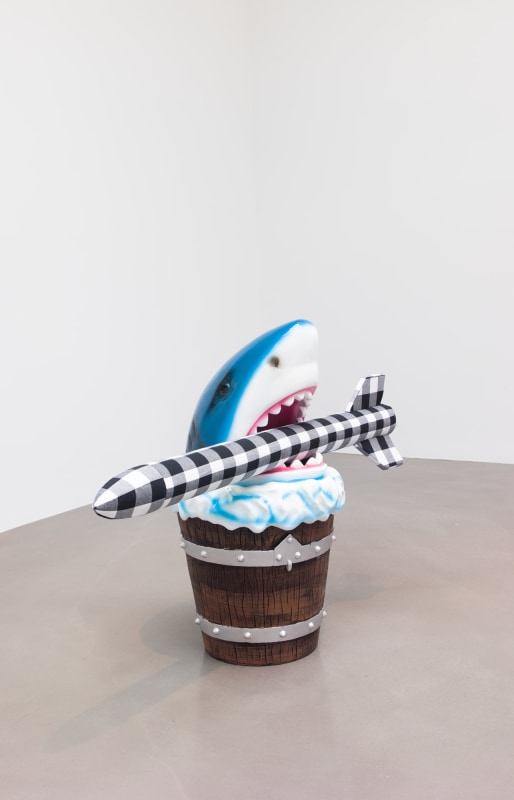
Cosima von Bonin
WHAT IF IT BARKS 8 (SHARK DUST BIN VERSION I)
2018
Plastic, fabric, wood, cardboard
44 x 46 x 27 inches

Cosima von Bonin
WHAT IF IT BARKS 8 (SHARK DUST BIN VERSION I)
2018
Plastic, fabric, wood, cardboard
44 x 46 x 27 inches
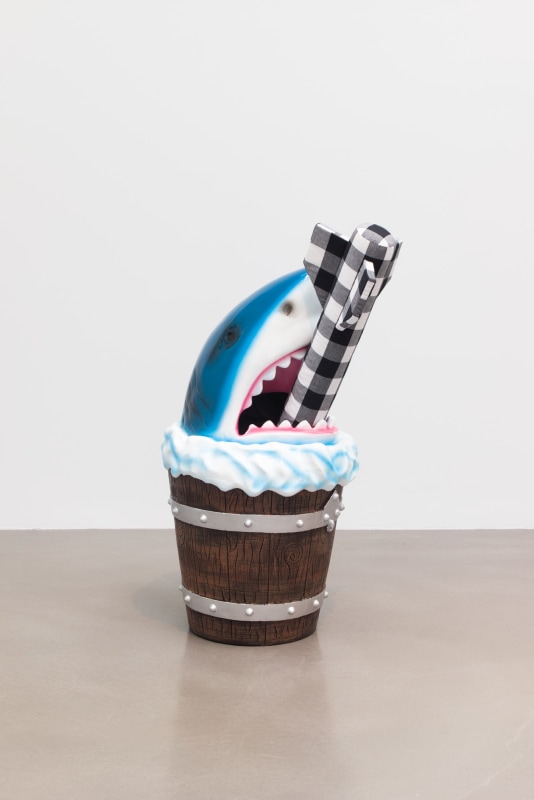
Cosima von Bonin
WHAT IF IT BARKS 9 (SHARK DUST BIN VERSION II)
2018
Plastic, fabric, wood, cardboard
49 x 28 x 41 inches
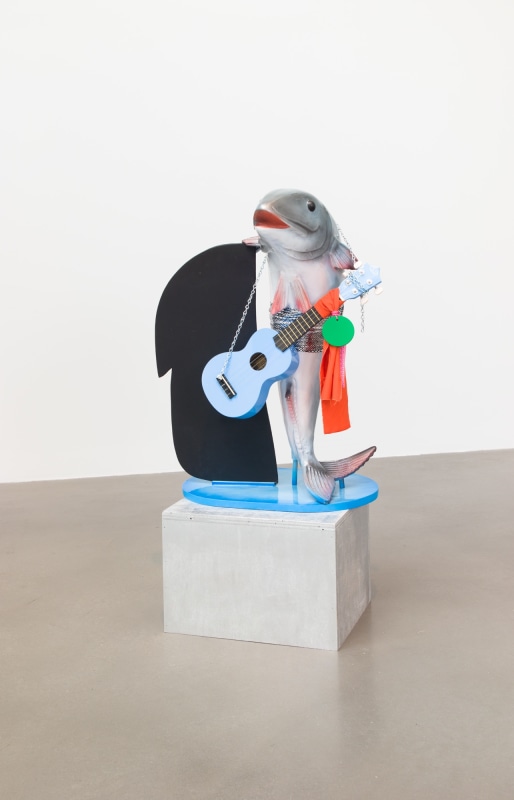
Cosima von Bonin
WHAT IF IT BARKS 5 (PETITE VERSION WITH BLUE UKULELE)
2018
Plastic, fabric, wood pedestal, ukulele, chain, rubber, scarf
42 x 24 x 18 inches
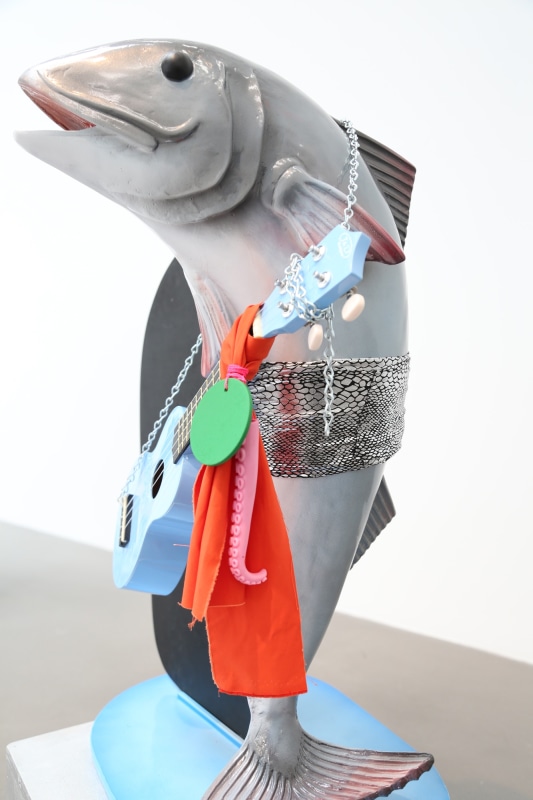
Cosima von Bonin
WHAT IF IT BARKS 5 (PETITE VERSION WITH BLUE UKULELE)
2018
Plastic, fabric, wood pedestal, ukulele, chain, rubber, scarf
42 x 24 x 18 inches
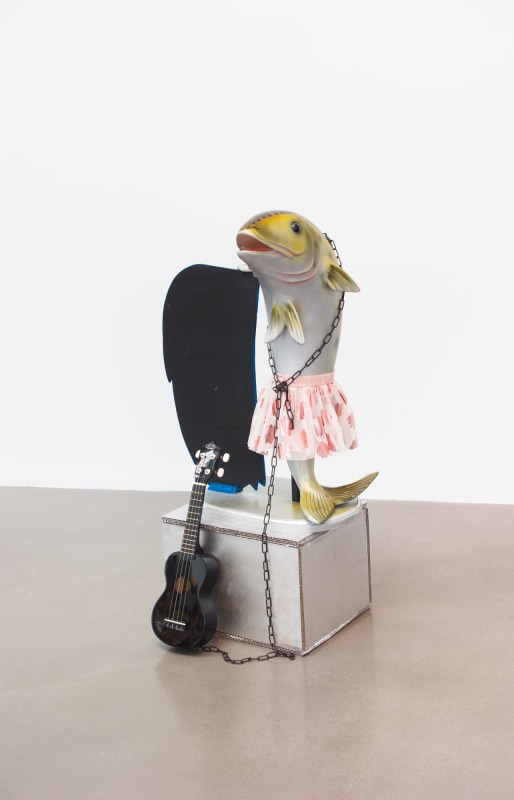
Cosima von Bonin
WHAT IF IT BARKS 6 (PETITE VERSION WITH BLACK UKULELE)
2018
Plastic, fabric, wood, cardboard pedestal, chain, ukulele
43 x 23 x 20 inches
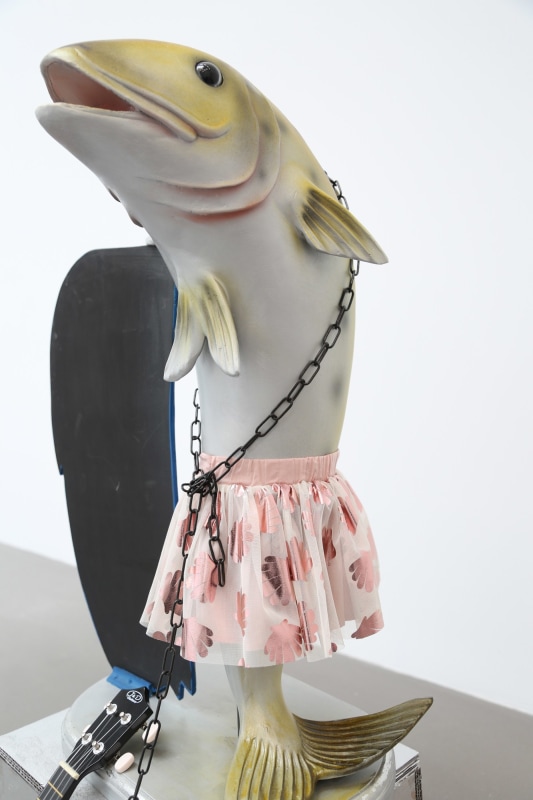
Cosima von Bonin
WHAT IF IT BARKS 6 (PETITE VERSION WITH BLACK UKULELE)
2018
Plastic, fabric, wood, cardboard pedestal, chain, ukulele
43 x 23 x 20 inches
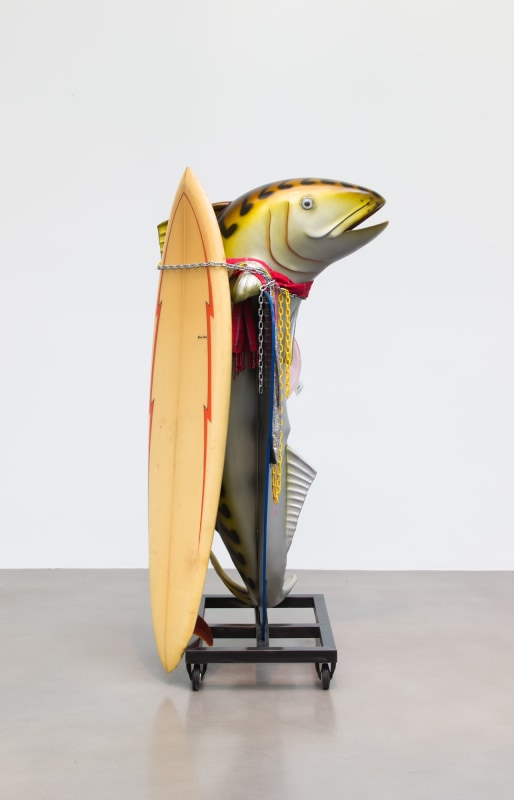
Cosima von Bonin
WHAT IF IT BARKS 4 (SURFBOARD VERSION)
2018
Plastic, fabric, wood, steel stand, chains, Gerry Lopez 70's surfboard, string, leather/plastic smiley face cooler bag, scarfs
79 x 45 x 35 inches
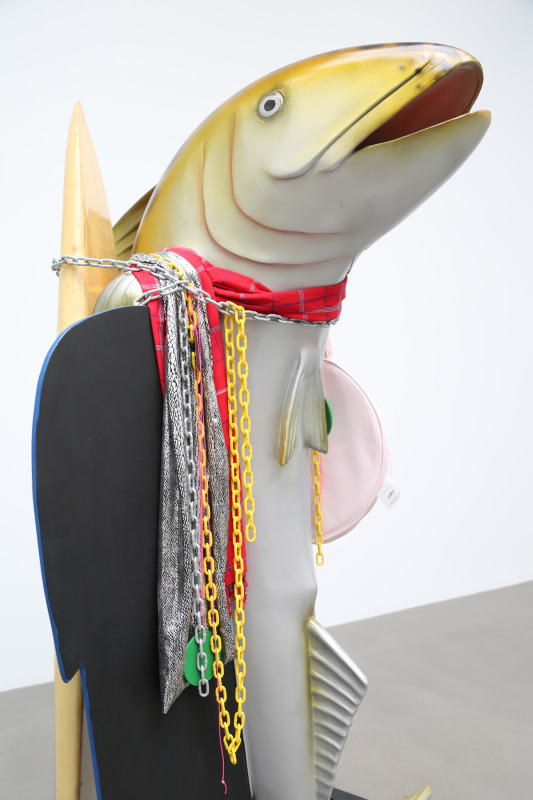
Cosima von Bonin
WHAT IF IT BARKS 4 (SURFBOARD VERSION)
2018
Plastic, fabric, wood, steel stand, chains, Gerry Lopez 70's surfboard, string, leather/plastic smiley face cooler bag, scarfs
79 x 45 x 35 inches
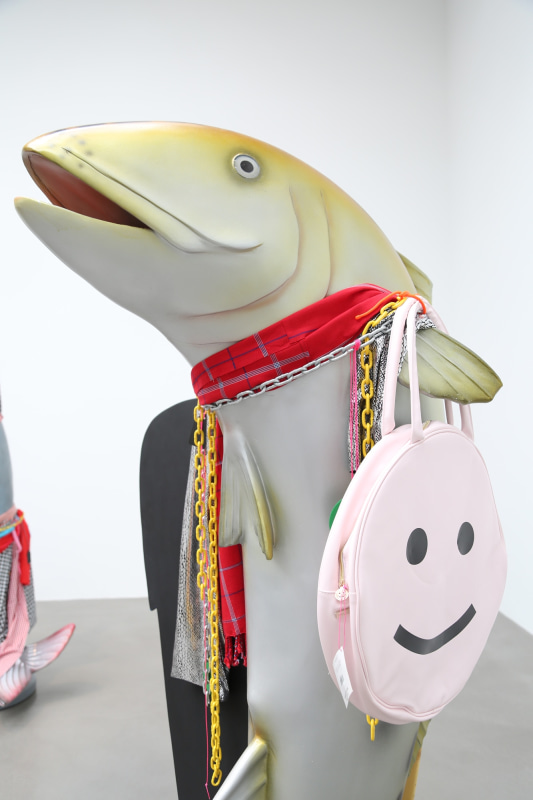
Cosima von Bonin
WHAT IF IT BARKS 4 (SURFBOARD VERSION)
2018
Plastic, fabric, wood, steel stand, chains, Gerry Lopez 70's surfboard, string, leather/plastic smiley face cooler bag, scarfs
79 x 45 x 35 inches
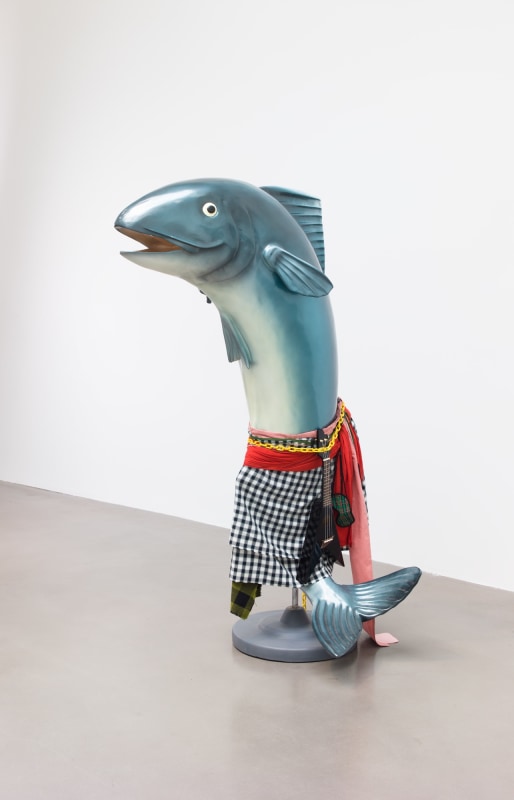
Cosima von Bonin
WHAT IF IT BARKS 3 (BLACK UKULELE VERSION WITH GHOST)
2018
Plastic, fabric, scarfs, chains, ukulele, rope, steel base, sleeping mask
77 x 36 x 40 inches
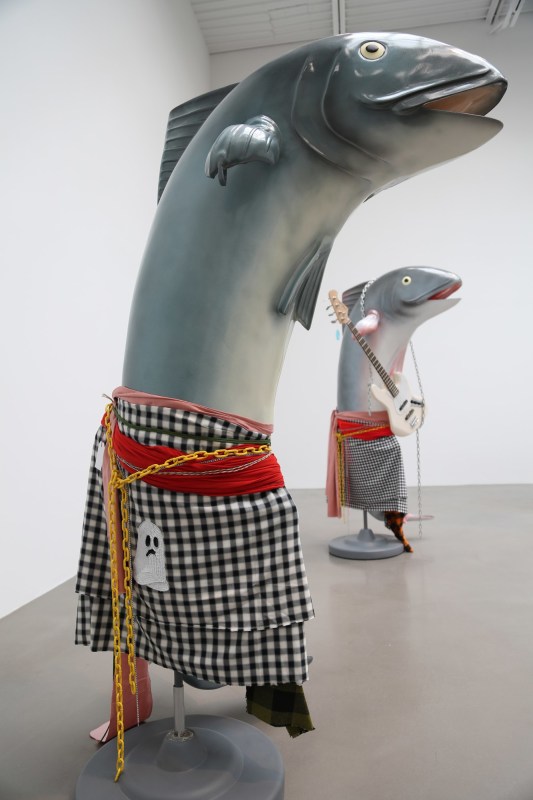
Cosima von Bonin
WHAT IF IT BARKS 3 (BLACK UKULELE VERSION WITH GHOST)
2018
Plastic, fabric, scarfs, chains, ukulele, rope, steel base, sleeping mask
77 x 36 x 40 inches
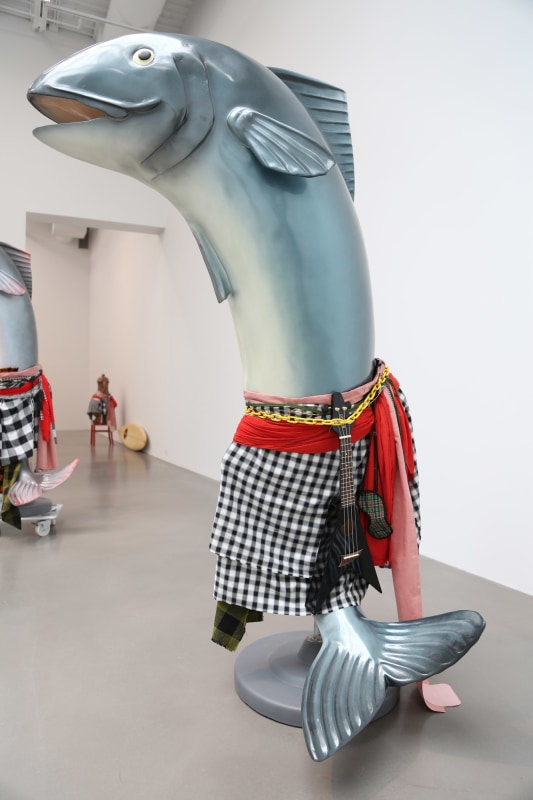
Cosima von Bonin
WHAT IF IT BARKS 3 (BLACK UKULELE VERSION WITH GHOST)
2018
Plastic, fabric, scarfs, chains, ukulele, rope, steel base, sleeping mask
77 x 36 x 40 inches
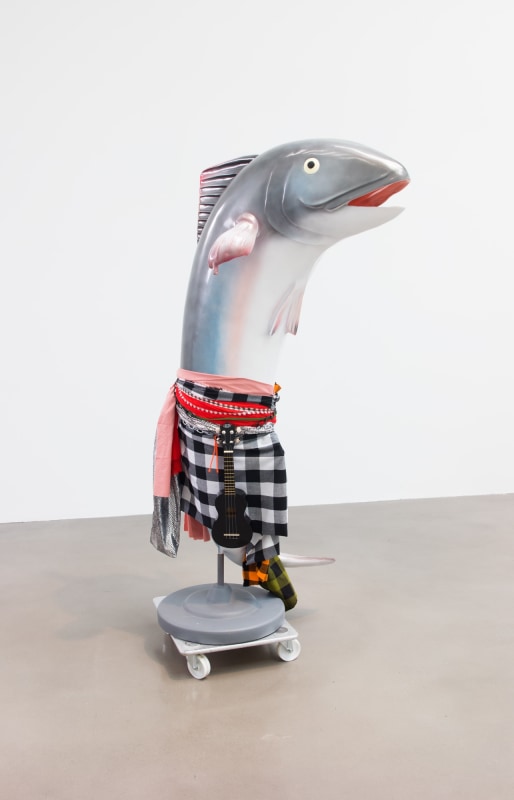
Cosima von Bonin
WHAT IF IT BARKS 4 (BLACK UKULELE VERSION)
2018
Plastic, fabric, scarfs, chains, rope, steel base, wooden dolly, ukulele
81 x 36 x 45 inches
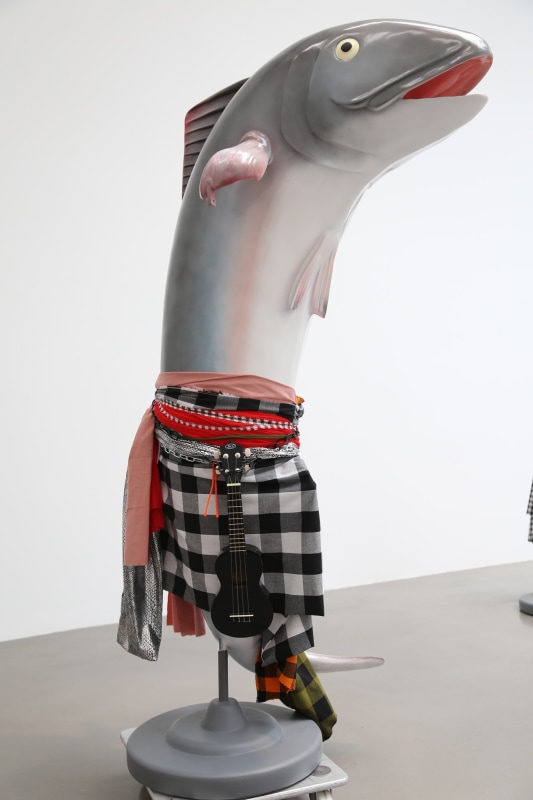
Cosima von Bonin
WHAT IF IT BARKS 4 (BLACK UKULELE VERSION)
2018
Plastic, fabric, scarfs, chains, rope, steel base, wooden dolly, ukulele
81 x 36 x 45 inches
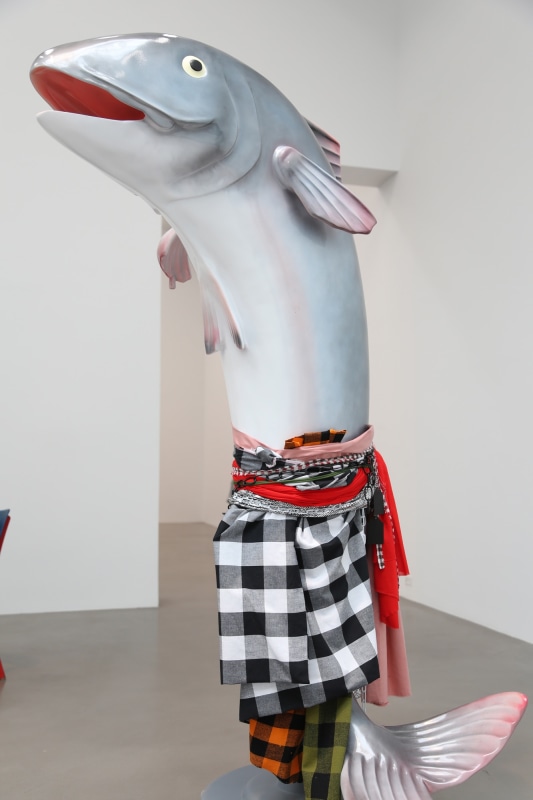
Cosima von Bonin
WHAT IF IT BARKS 4 (BLACK UKULELE VERSION)
2018
Plastic, fabric, scarfs, chains, rope, steel base, wooden dolly, ukulele
81 x 36 x 45 inches
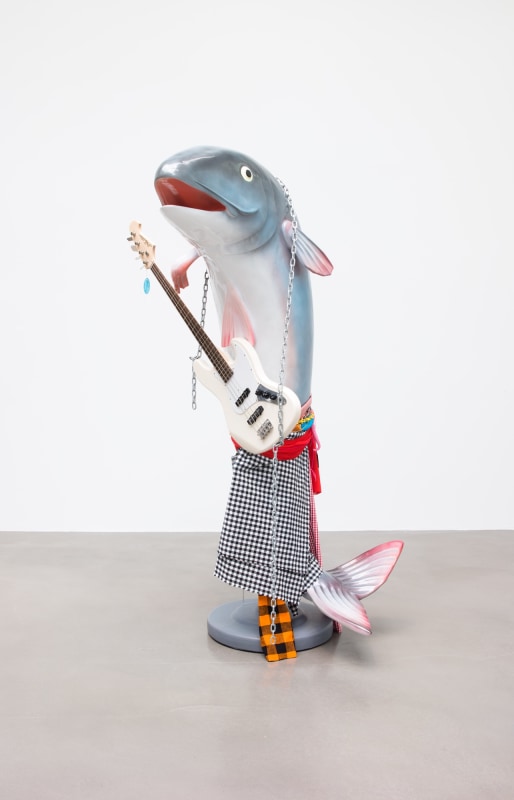
Cosima von Bonin
WHAT IF IT BARKS 1 (WHITE BASS GUITAR VERSION)
2018
Plastic, fabric, bass guitar, scarfs, chains, twine, steel stand, rubber octopus tentacle
76 x 50 x 48 inches
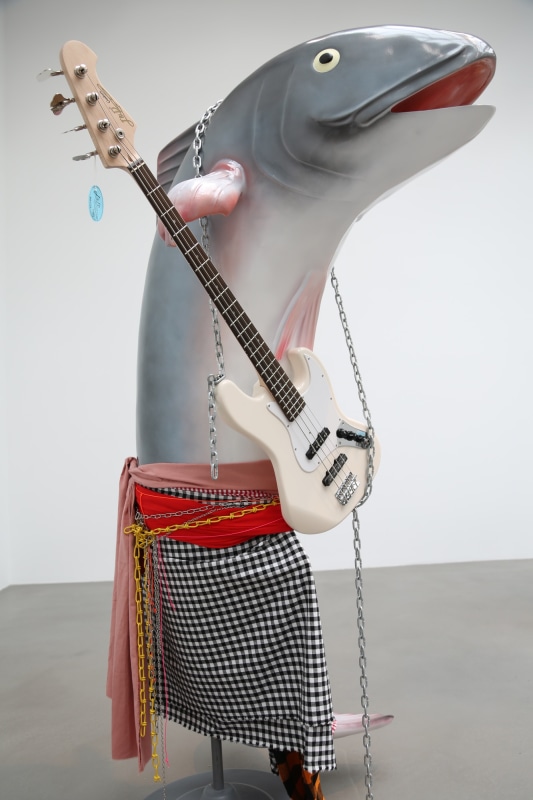
Cosima von Bonin
WHAT IF IT BARKS 1 (WHITE BASS GUITAR VERSION)
2018
Plastic, fabric, bass guitar, scarfs, chains, twine, steel stand, rubber octopus tentacle
76 x 50 x 48 inches
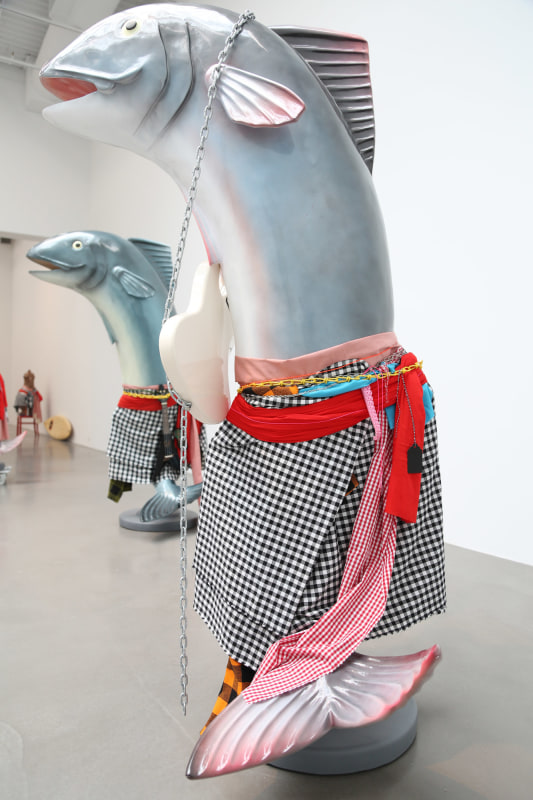
Cosima von Bonin
WHAT IF IT BARKS 1 (WHITE BASS GUITAR VERSION)
2018
Plastic, fabric, bass guitar, scarfs, chains, twine, steel stand, rubber octopus tentacle
76 x 50 x 48 inches
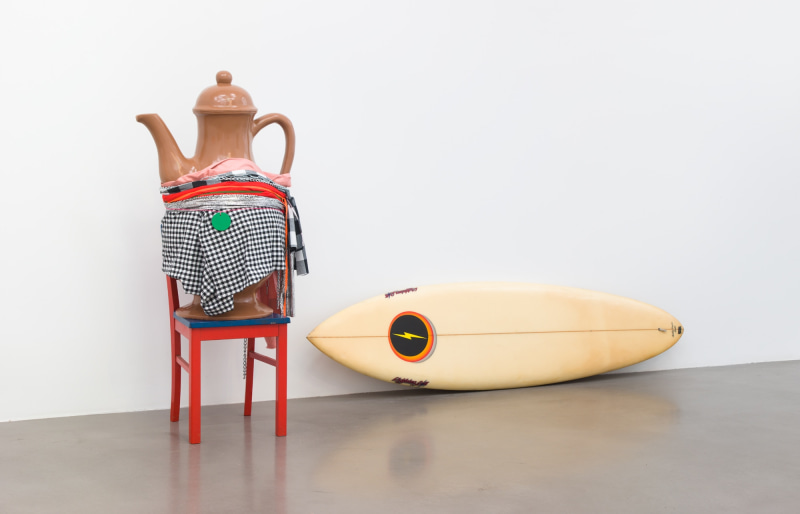
Cosima von Bonin
WHAT IF IT BARKS 7 (COFFEE POT VERSION)
2018
Plastic, fabric, wooden chair, 70's surfboard, scarfs, chains, shoe laces, twine/rope
58 x 28 x 33 inches
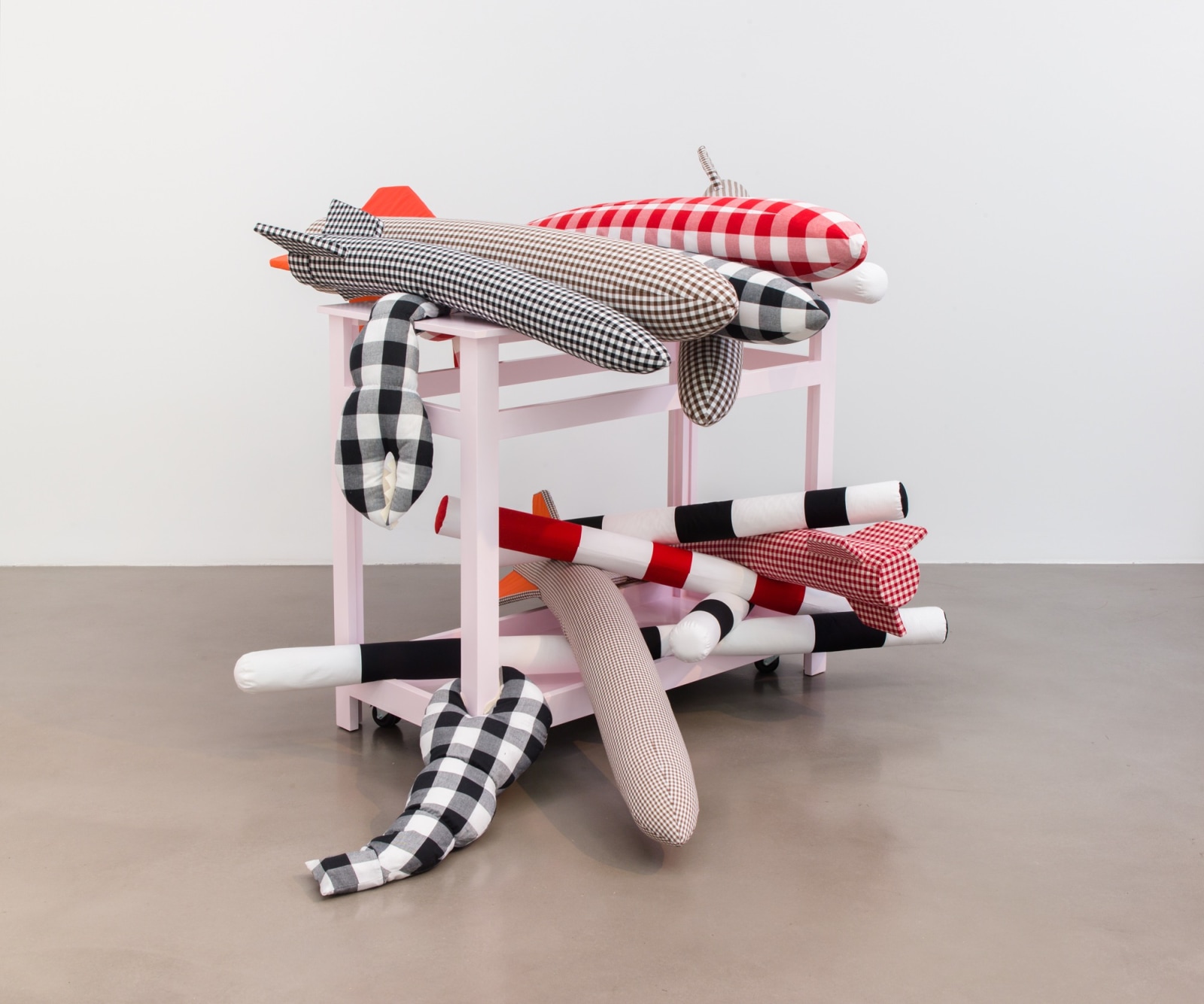
Cosima von Bonin
AU PAIRS
2018
Cotton and wool covering cardboard, wooden table
55 x 72 x 84 inches
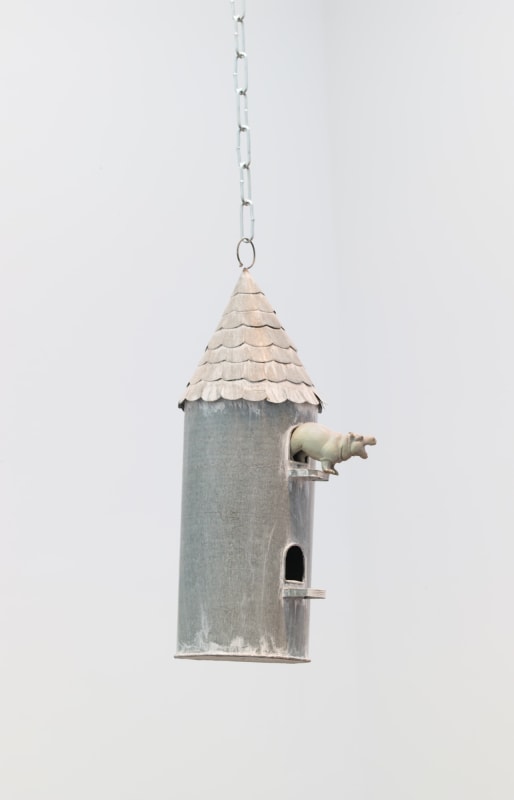
Cosima von Bonin
HIPPO'S HOUSE (PROPERTY OF ARNOLD MOSSELMAN, THE HAGUE)
Tin, rubber
14 x 6 inches
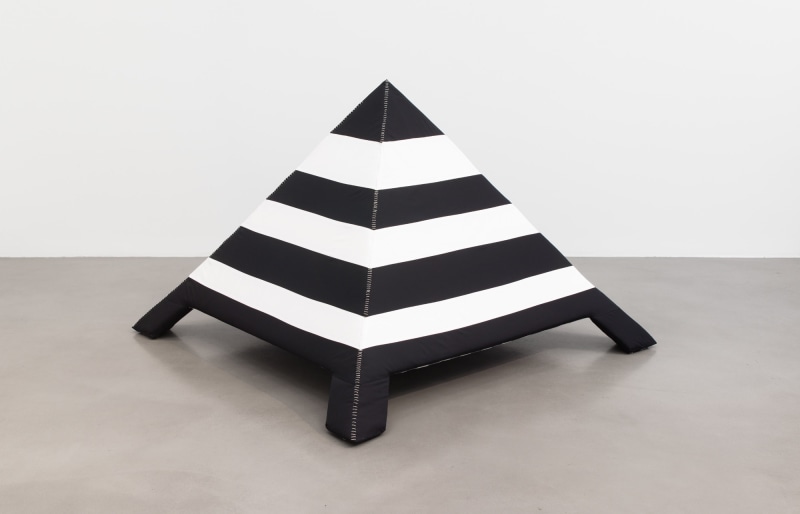
Cosima von Bonin
Installational elements: Pyramid
2018
Cotton and wool covering cardboard, thread
43 x 66 x 68 inches
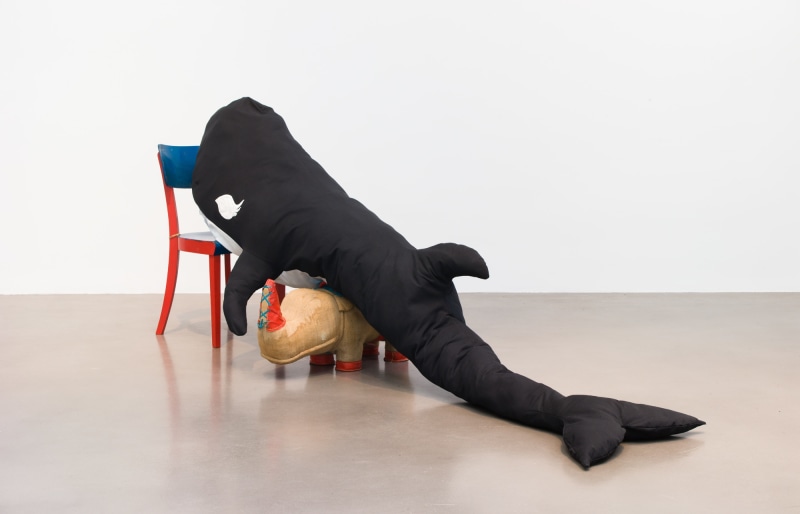
Cosima von Bonin
KILLER WHALE WITH LONG EYELASHES I (RHINO* VERSION)
*Rhino by Renate Mueller, Germany, 1960s
2018
Fabric, leather, canvas, wooden chair
42 x 105 x 39 inches
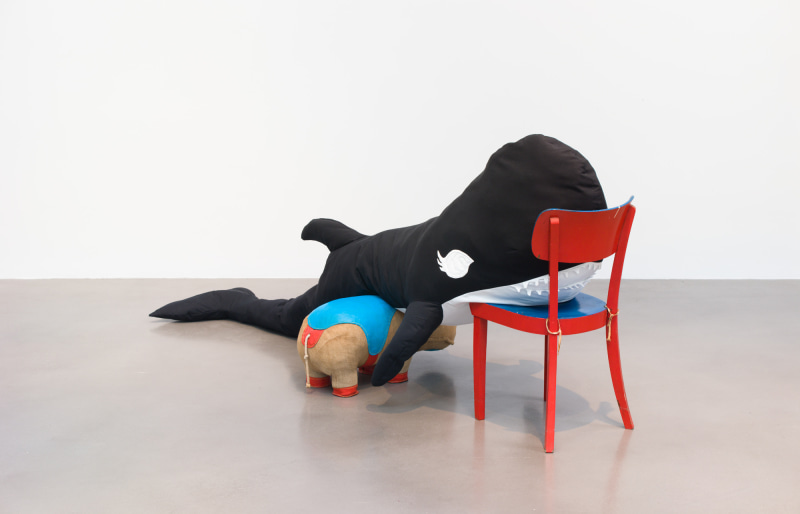
Cosima von Bonin
KILLER WHALE WITH LONG EYELASHES I (RHINO* VERSION)
*Rhino by Renate Mueller, Germany, 1960s
2018
Fabric, leather, canvas, wooden chair
42 x 105 x 39 inches
After Cosima von Bonin’s extensive European traveling retrospective “The Lazy Susan Series” ended at the Ludwig Museum in Cologne in 2011, the artist went into a self imposed pre-retirement, only to be interrupted by another extensive show at MUMOK, Vienna in 2014.
Then she had enough!
That is until 2016 when von Bonin’s decades’ long fascination with the deep-sea was brought to the fore in a traveling sculptural show, “Who’s Exploiting Who in the Deep Sea?” From Glasgow International, to New York’s Sculpture Center, and in 2017 Oakville Galleries, Ontario, von Bonin’s cast of oceanographic characters rippled with mystery, fun and contradiction.
WHAT IF IT BARKS? featuring AUTHORITY PURÉE, von Bonin’s first full scale installation at Petzel’s 18th Street location (her eighth show with the gallery), is marked by more curious incongruities. The artist’s marine motif is updated and extended in the gallery space to a sweeping fish farm: A group of polyester shark heads lurk in the open tops of wooden barrels—each jaw smirks, gnarling a soft toy rocket. Robed mackerel in synchronized display appear alongside bass-guitar and ukulele toting piscine beings, accented by 1970s-style short-board surfboards. But life is not all aquatic: Suspended from the ceiling an open, oversized cat food can exhales contiguous puffs. Printed on the side in white lettering are the words, “AUTHORITY PURÉE”. Von Bonin’s signature ‘rags’ or cloth paintings dangle from the gallery walls and dive deeper into nautical spheres.
Cosima von Bonin was born in Mombasa, Kenya in 1962. Her work has been exhibited widely throughout the United States and internationally. Solo exhibitions include MUMOK, Vienna (2014); Artipelag, Sweden (2013); Mildred Lane Kemper Art Museum, St. Louis (2011); Arnolfini, Bristol (2011); Musée d’Art Moderne et Contemporain, Geneva (2011); Museum Ludwig, Cologne (2011); Kunsthaus Bregenz, Austria (2010); Museum of Contemporary Art, Los Angeles (2007); documenta 12, Kassel (2007).
—
The foundations of Cosima von Bonin’s work lie in the performativity of things that have a transformative quality. Like George Brecht she understands art as a poetic act and a social activity. For Brecht each object could be an event, and each event could have the character of an object. Cosima von Bonin stages her objects while holding back a lot of information about the meaning of things. Her intentions keep slipping away. But once you can let go the determination to clearly understand, and bend that urge into a more relaxed relationship with the work, you can become her companion on a journey by setting off without an ultimate destination.
Some foggy notions.
CvB’s body is close-by but most of the time invisible.
In humorism, or humoralism, the doctrine of the four temperaments, the body is not seen as a closed unit, but functions as an open system that is constantly in contact with its environment.
CvB is never finished, never completed, is continually built, created, and builds and creates other bodies. She breaks out of her boundary like the grotesque body does in the work of Mikhail Bakhtin.
CvB is like a foggy cloud, a phantom that transforms now and then in an extra-terrestrial plop sculpture descending from the skies, like a UFO sucking up everything that is around her.
She becomes a figure of unruly social exchange. CvB is hiding, not behind but inside her friends. They become her for a moment performing an ectoplasmatic quatsch play with objects: airy nonsense with meaning hiding inside somewhere.
—Arnold Mosselman
—
A: Cosima von Bonin, what’s on your mind at the moment?
B: Late capitalism, robots and social isolation. As usual.
A: Uh, that sounds very dystopic.
B: If you see it from a distance, it’s less frightening.
A: Late capitalism?
B: The Fatigue Empire show, for example, celebrated slothfulness, and was a reaction in a way to late capitalism and its constant need to have people function, to have them work on themselves, to be creative and to handle creativity profitably. Even losers are not allowed to be losers anymore but have to focus on permanent self-improvement. The Fatigue Empire represented an opposing notion that wanted to champion the exhaustion and fatigue that everyone of course experiences.
A: Your new show is inhabited by a lot of sea creatures.
B: I’ve got robed mackerels and killer whales and shark dustbins and ukuleles and buoys and surfboards.
I stole the idea for the robed mackerels from the decorator crabs. Give them a pearl necklace, or some holiday pom poms or anything else of that kind, and they decorate themselves with it. Accessories are Life for those crustaceans.
I’ve got lots of chains and a giant cat food can that is smoking. Those are not from the sea.
A: Do you have a special connection to the sea?
B: I come from the sea.
A: You mean, you lived by the sea.
B: No, I come from the sea.
A: So the mackerels and sharks and cephalopods and crustaceans are your friends?
B: All creatures are my friends, hyenas and frogs are my friends, too.
A: So that´s a lot of friends then.
B: Un million d´amis.
A: How do you come up with the themes and topics of your work?
B: Everything comes to me while I watch British shows and movies, listening to music and things like that. Or I steal it somewhere. I mostly sleep.
A: But you created a lot of art, your shows are always opulent and remind me of giant department stores.
B: Yes, I do that between naps.
A: Impressive.
B: I try to avoid all that career stuff. But then somehow things squeeze in, like friends that look for you when they haven´t heard of you for some time. And then it makes sense to get up.
I’ve got this sentence of Mike Kelley’s on the wall opposite my bed so I immediately know what to do when I wake up: “It's not a kind of sense, it's a kind of sense-making, like we'll take this, we'll take this, this leads me to this, this leads me to this and then I have to figure some kind of structure for that and that's the art of it..." I'm quite good at deciding or knowing what is good and what is garbage.
A: You still live in Cologne, where you started your career with artists like Martin Kippenberger, Michael Krebber and Kai Althoff.
B: Yes.
We are not many, most of my friends left to go to Berlin or New York a long time ago. The ones that stayed are friends of top-notch quality though. The nice thing about Cologne is that nobody watches us doing our things. I like that.
I have a small garden here. Green parrots come and visit, they escaped from the zoo. Recently I had new stupid gardeners come to cut some bushes and whilst I was out for a minute, they cut down everything. A massacre. All the bushes, and the wild grass that I dug out somewhere. I am now rebuilding everything, which will take ages to groom, so I´m in the middle of Cologne and regrowing the garden. The parrots still come, and I’ve got salamanders and toads and lots of insects and sometimes two or three human friends come and we have a barbecue or just sit there in the green. Why move?
A: You are surrounded by friends it seems.
B: It sounds like that, but it’s all very unedited and relaxed. It´s not Berlin or New York, it´s Cologne. I additionally have some friends that are sort of imaginary. I love Olaf the Snowman from the Disney Movie for example. I consider him a friend of mine.
A: Why is that?
B: He has no skull or bones, just like me.
A: I See. Thank you very much for the interview.
B: It was my pleasure.
—
Authority Purée
I've been swimming in the ocean recently. A small shoal of fish was there and I passed rocks and plants and bigger fish crossed my way and it was elemental and peaceful and truly magical and somehow extraterrestrial and I immediately wanted to stay there. Forever. Do you know that feeling when you wake up and feel unadaptable, stranded and useless. One of these days…you think to yourself: "Don´t make such a spectacle of yourself. Get out of bed immediately. Go to the plaza where they serve authority purée. Suck it up." Cosima von Bonin brings lots of different creatures into being, some are from the sea, some are dogs, some derive from cartoons or from the movies. Some of them are limp, exhausted, floppy and worn out. Others are rather flexible, and a few of them are carefree like surfers. This time, amongst them is a guest. A creature by Renate Müller, legendary toy designer from Sonneberg. It is a rhino made from burlap and leather that can stand every tantrum of a child, every outburst of tears, it is as patient as can be. It is a therapeutic toy from the 1970s. I guess the other creatures need such a beast from time to time. The rhino can be kicked, clasped, you can lean against it or pet it of course. It takes it all as it comes. It comes from another world, a world of unconditional love. Such a world cannot be found at every corner, but it exists somewhere, just like the deep sea. Let’s pretend that this text was written in bed, in a slumberous mood, between vague dreams and deep sleep.
Here is a poem from there:
Whale, whale, mackerel
Sharks bite rockets
Fill your pocket
With the finest enemies
Bring them to the deepest seas
See us lose our sense of duty
Hear the guitars fade away
See these things of strangest beauty
Great authority purée!
—Claus Richter